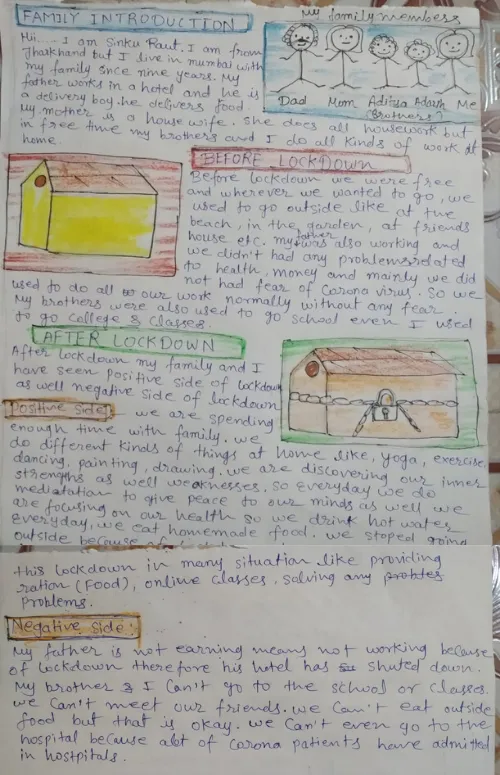This woman left the corporate world after 20 years to educate children in Mumbai’s slums
From bringing together nearly 700 volunteers to teach over 2,200 children living in the slums of Mumbai, to now providing rations to their families, Anubha Sharma’s team at Angel Xpress Foundation is forging co-existence between different groups.
Mumbai, romanticised as ‘the city of dreams’ has a charming diversity of its own. It is home to the ultra-rich, upper and lower middle-class families, and many daily wage earners who have migrated from remote areas of India to earn their living. In the bustle of everyday life, there is little chance for these economically different classes to come together, socially.
However, Anubha Sharma is connecting volunteer teachers – mostly educated women from middle-class families – with children living in the slums across 20 free learning centres in Andheri, Santa Cruz, Juhu, and 15 other locations.
In 2012, she founded the Angel Xpress Foundation, a non-profit, to start this initiative that has now made volunteers out of 700 Mumbaikars to teach English, Mathematics, and life skills to the underprivileged children, in addition to their government school curriculum.
Most centres host two batches of classes between 10 am and 12 noon and between 3 pm and 6 pm and provide snacks. The organisation’s core team members of eight provide teaching resources and training to the volunteers.

Anubha Sharma, Co-founder of Angel Xpress Foundation
Community of volunteers
A former financial services professional, Anubha earlier worked with organisations like Kotak Securities and Reliance Money. In 2011, she moved to Mumbai in her last stint as Head of Equity Sales for Wealth and Investment Advisory Business at Edelweiss.
During her morning walk at Carter Road in Mumbai, she noticed children sitting on mat on the promenade and some older people teaching them. She approached them and asked if she could bring food for the children. Anubha was told a lot of people offered food but very few made the time to teach children.
“I had never taught before and was unsure. I enjoyed the interactions once I started but unfortunately, there was a huge gap in their education. Even sixth standard students did not know basic geographies like Mumbai or the world or names of animals,” she recalls, adding that education was important for them to live a better and different life compared to their parents.
However, she noted they were keen to learn and walked two km every morning for the sessions.

Anubha Sharma and Beenaa Advani, Co-founders of Angel Xpress Foundation NGO
One chilly January morning when she started a class at 7:30 am, “one child asked if she could sit in the centre of the group to stay warm. I looked around and saw some of them wearing jackets and sweaters and some had come in T shirts.”
After the class, Anubha called her friends and posted messages on social media platforms requesting people to donate clothes for children. Her phone kept ringing for the next 10 to 12 days.
She says, “More than 3,000 people called to offer help of all kinds. That made me realise a lot of people want to help but don’t know how they could.”
Struck by this divide, she started adopting the teaching model in most neighbourhoods of Mumbai. “The idea behind the initiative is coexistence. We have slums and high rises in every corner of the city. I thought it was an experiment worth trying.”

Classes in session
The community responded with kindness. Beena Advani, now co-founder of the Foundation, was running a school and offered to use the facilities as the classrooms were empty after 6 pm.
More women joined in and were touched by the newfound appreciation they received from children. They told Anubha that their own children would not acknowledge their help with studies. Encouraged by the response, Anubha quit the corporate world after two decades and started building the Angel Xpress Foundation.
Changing lives
Teaching more than 2,000 students, its work is supported by Bollywood megastar Salman Khan’s charitable trust Being Human, fabric and fashion retailer The Raymond Group, Larsen & Toubro, and Millennium Alliance, among others.
For 16-year-old Nihal Mishra, being backed by the organisation has majorly boosted his confidence. Associated with the Foundation for the last five years, it has helped him pursue his dream to become a playback singer, besides academics – Nihal scored 88 percent in the SSC exam.

16-year-old Nihal Mishra with Bollywood actor Sonakshi Sinha
Through the AXF Foundation, he got in touch with Music Ustaad School and later, was noticed by Bollywood actor Sonakshi Sinha. “Dola Basu Shome ma’am (Founder of Music Ustaad School) helped me a lot with my singing skills and I am so grateful to get a chance to be part of an organisation like this,” Nihal adds.
Life post COVID-19 pandemic
While most other social and economic activities have come to a standstill, post the nationwide lockdown to curb the COVID-19 outbreak, Anubha and her team continue to work but their priorities have shifted.

A lockdown essay written by Sinku Raut, a 12th standard student at Sathaye College and beneficiary of Angel Xpress Foundation.
From being an education-first organisation, it is juggling to provide basic food requirements for children and their family members – most of whom are migrant workers dependent on daily wages.
Mumbai, where the Foundation and its beneficiary children are based, is now the epicentre of the COVID-19 outbreak in India, with overall 39,464 positive cases of COVID-19.
So far, they have distributed two months' worth of ration to all families of the Foundation's students and an additional 800 other families as well.
When the wholesale markets in Mumbai were shut down, they had to source rations from Aurangabad with help from Samta Foundation.
Through UNICEF, the Foundation was connected with Cipla Foundation, Dream Sports Foundation, and other major donors who supported their relief efforts. Asif Zakari, a supporter of the Foundation connected them with EY Foundation.
As the centres remain closed, most volunteer teachers are organising some form of online interaction through WhatsApp groups. Still, Anubha says that nearly 80 percent of the children would have access to the phone only if their fathers were at home and internet access and connectivity remain an issue.
Volunteers of the Foundation are trying to speak to the students, understand their needs and solve one problem at a time, and hopefully, the education shall continue, uninterrupted.
Edited by Rekha Balakrishnan










